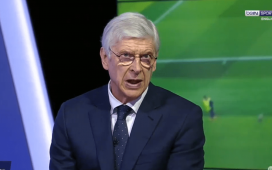Even in an era of anthem protests and White House boycotts, there is something about Justin Jackson that feels like a new mold for the politically energized athlete.
Jackson, a running back for the Los Angeles Chargers, has spent the first two years of his NFL career operating in a reserve role in one of the deepest backfields in the league. But in the most left-wing corners of Twitter, Jackson has become an overnight star, trucking over centrist Democrats and neoliberals with a zeal usually accompanied by a rose emoji.
He derided Pete Buttigieg as a “moderate Republican” and chastised an MSNBC pundit who had spoken dismissively of Bernie Sanders, Jackson’s preferred 2020 hopeful; he condemned the US drone strike that killed Iranian military leader Qassem Soleimani and criticized the bellicosity of American media.
Justin Jackson
(@J_ManPrime21)Offering $1000 to anyone who can show me one mainstream news channel (@CNN @MSNBC @FoxNews @ABC @NBCNews ) who in the last two decades has been wholesale against** one singular war America has waged or provoked. Serious offer. #StateMedia
His Twitter following has swelled from just a little under 10,000 at the beginning of the year to more than 42,000 and climbing. It’s all been part of a premeditated strategy for Jackson, who said he made it a point to increase his Twitter output after the Chargers’ season ended in an effort to bolster Sanders’ candidacy.
“I’ve definitely ramped it up. I wanted to be as helpful as I can to the cause,” Jackson tells the Guardian. “I’m very busy during the season, putting a lot of hours in. So it was the perfect storm with the new year and my season ending.”
And he sees parallels between the life of a politician and an athlete. “I want to push for things that help the most people, and that’s a progressive champion like Bernie and progressive policies,” he says. “For me, it’s consistency. Being an athlete, consistent improvement is what I’m always thinking about. For Bernie, it’s consistency in his policies, and really his principles. He’s been fighting for these things, even when they weren’t on the minds of most Americans, when they weren’t polling well. I know when it comes down to it, you’re going to have to fight the Republicans tooth and nail for everything, and Bernie has a movement behind him. He’s going to have to have a movement of people in the streets, putting pressure on Democrats and Republicans – especially Democrats – to come around and vote for his platform.”
Jackson is hardly the first professional athlete to use social media as a political vehicle, but few have done so as relentlessly as he has in the last few weeks. It’s one thing to fire off a tweet in support of a candidate; it’s another to be a poster. Jackson’s politics are not just a peripheral part of his Twitter persona.
There’s a generational element to all that, of course – and not just because Jackson, like so many of his contemporaries, spends plenty of time online. His political awakening came in 2016, when he was in the midst of an illustrious career at Northwestern University. That was the first year Jackson, 23, was eligible to vote in a presidential election; up to that point, he hadn’t given politics much thought. But Jackson was on a politically minded squad. (In 2015, the Northwestern football team tried unsuccessfully to become the first college athletes’ union in the United States.) And as he listened to his teammates discuss the 2016 race, Jackson’s interest was piqued.
“We were having all these conversations in the locker room,” he recalls. “I don’t like to talk out of my ass, so I knew I had to get more knowledgeable on these issues.”
What ensued was a crash course in progressive media. He began reading The Intercept and The Nation, and tuning in to online programs like The Kyle Kulinski Show and The Rational National. The Young Turks, a left-wing YouTube channel, quickly became one of Jackson’s touchstones.
“I was not very politically active before that, which I think really helped me because once I became politically conscious I realized how much people are socialized and herded,” he says. “You don’t even think for yourself.”
All that makes Jackson illustrative of the type of voter who the Sanders campaign believes it has a unique ability to attract: young, previously disengaged from politics, unwedded to either party.
“I’m hoping in reality it’s even better than the polling because of all the grassroots support he has,” Jackson says of Sanders’ chances. “I’m hoping he has a lot of people who didn’t vote. That’s the biggest voting bloc: the people who didn’t.”
Jackson was selected by the Chargers in the seventh round of the 2018 draft after finishing his four-year career at Northwestern as the school’s all-time leading rusher. He said that some current teammates and former NFL players have applauded him for his politically charged tweets, and that no one associated with the Chargers franchise has told him to dial it back. That last part can’t be taken for granted, given the ongoing league-wide freezeout of Colin Kaepernick, the uproar surrounding players kneeling during the national anthem and the oft-invoked admonitions for athletes to “stick to sports.”
Jackson, who was still in college when the anthem protests began, said he has even greater appreciation for the likes of Kaepernick since entering the NFL.
“It’s such a hard profession to stay in,” Jackson says. “There’s so much focus you have to have on keeping your job, performing year in and year out, that it is a little bit harder to step outside the box. It’s different than the NBA, it’s different than these other leagues, where each player has their own face. It’s a much more collective team game [in the NFL]. It’s just a tough tough arena to be a part of and try to step outside the box, which is why I commend Kaepernick so much. He’s definitely a martyr for the cause.”
Jackson says politics aren’t brought up as often in the Chargers locker room as when he was at Northwestern in part because of the structure of an NFL workday, which offers less downtime and fewer opportunities for team-wide discussion. But he said the roster includes both fellow leftists as well as “Trump Republican voters of all races.”
“I think it comes down to messaging. A lot of times, you might not want to pay taxes if you don’t think those taxes are going to come back to help you. When you’re not seeing your taxes work for you, of course you don’t want to pay your taxes,” Jackson says, in reference to his Trump-supporting peers. “That’s where I think a true progressive candidacy and presidency can change a lot. You could see your tax dollars working in a substantial way.”
Whether Jackson ends up making that case outside the confines of Twitter remains to be seen. He has already donated to the Sanders’ campaign but, for now, he says he’s more comfortable tweeting than canvassing.
“I’ve been thinking about volunteering, but as far as walking around and talking to people, I’m actually not that great at that.”














